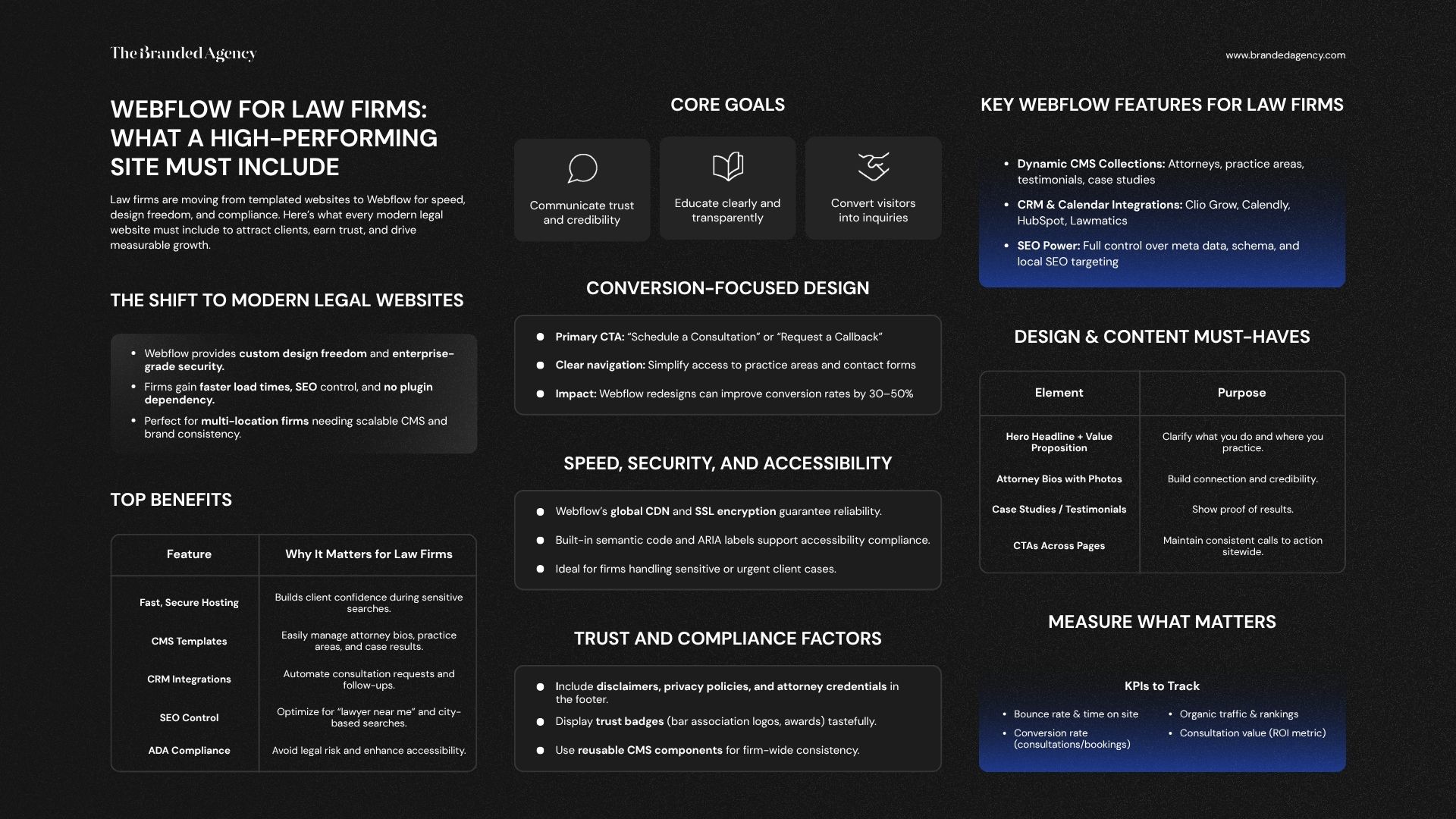Webflow for Law Firms: What a High-Performing Site Must Include
10/27/2025
Web Design / Web Dev
For law firms ready to scale, Webflow delivers a faster, more secure, and conversion-optimized digital presence that outperforms traditional legal websites.

Over the last few years, law firms have begun shifting from rigid WordPress themes and templated legal sites to Webflow, a platform that offers design freedom, lightning-fast performance, and compliance-ready features.



Why Law Firms Are Moving to Webflow



Unlike most website builders, Webflow empowers firms to create bespoke digital experiences that reflect their professionalism without compromising speed, security, or SEO.
Whether you’re a solo practitioner or a multi-location firm, a high-performing Webflow site can dramatically increase your leads, reduce maintenance headaches, and establish authority in a competitive field.
The Anatomy of a High-Performing Law Firm Website
A law firm’s website isn’t just a digital brochure, it's a client conversion engine. A high-performing legal site must do three things flawlessly:
- Communicate trust and credibility
- Educate potential clients clearly
- Convert visitors into inquiries with minimal friction
Let’s break down the essentials.
Conversion-Focused Design
Every successful law firm website guides visitors toward one clear goal: contact.
Your homepage should feature a prominent call to action, such as “Schedule a Consultation” or “Get Legal Help Now.”
Each practice area page must answer three key questions:
- What legal issue do you solve?
- Who do you help?
- What makes your firm uniquely qualified?
A simple, focused layout with clear pathways to forms or consultation scheduling can boost conversion rates dramatically often by 30–50% after a Webflow redesign.
Speed, Security, and Accessibility
Law firm clients often search during stressful moments after an accident, job loss, or dispute. A slow or broken site instantly erodes confidence.
Webflow’s global CDN hosting and SSL encryption ensure your site loads fast and stays secure. Combined with built-in accessibility features (like semantic HTML and ARIA labels), your site is optimized for both clients and compliance.
Trust and Compliance Factors
Legal ethics rules require clear disclaimers, privacy policies, and attorney licensing details. Webflow makes this simple with reusable components and CMS fields for footers, disclaimers, and ADA compliance.
Trust badges (like bar association logos or award seals) should appear naturally, not cluttered reinforcing credibility without distraction.
Key Webflow Features That Benefit Law Firms












Webflow’s flexibility makes it ideal for law firms that need both custom branding and scalable content management.
Webflow CMS for Practice Areas and Attorneys
Webflow CMS lets you create dynamic templates for attorneys, practice areas, and case studies. This allows your team to easily add or edit content without needing a developer perfect for keeping your website updated as the firm grows.
Integrating Calendars, Forms, and CRMs
Webflow connects seamlessly with tools like Clio Grow, Calendly, HubSpot, or Lawmatics. This means visitors can schedule consultations, fill out intake forms, or be added to automated workflows directly from your website.
SEO and Schema Control for Legal Keywords
In law, SEO is hyper-competitive. Webflow provides full control over URLs, title tags, meta descriptions, and schema markup. You can optimize every page for keywords like “personal injury attorney in Denver” or “corporate law firm near me”, ensuring search engines understand your practice structure.
Design Essentials Every Law Firm Website Must Include
Clear Value Proposition and Case Specializations
Visitors must understand what you do instantly.
Your hero section should state your core service areas (e.g., “Criminal Defense and DUI Law in San Diego”) and link directly to those practice pages.
Attorney Bios with Personality and Proof
Clients don’t hire a law firm, they hire people. Your attorney bios should include credentials, human details (like community involvement), and professional photos. These pages often rank among the highest for engagement.
Case Studies, Results, and Testimonials
Social proof is critical in legal marketing. Showcase successful outcomes, testimonials, and client reviews (while respecting confidentiality). Webflow CMS makes it easy to publish and categorize these for SEO.
Prominent Calls to Action (CTAs)
Use consistent CTAs across all pages “Schedule a Consultation,” “Request a Callback,” or “Start Your Case Review.” Webflow’s designer lets you build these as reusable symbols so they remain visually consistent site-wide.
Content Strategy: Educate, Don’t Just Advertise
Clients searching for legal help often start with questions, not firm names. An educational content strategy builds trust before contact.
Blog and Resource CMS
A Webflow blog CMS allows your firm to publish articles answering common legal questions (“What to Do After a Car Accident” or “Steps to File for Divorce in Texas”).
Regularly updated content improves rankings and authority while driving organic leads over time.
FAQ and Legal Glossary Pages
Create dedicated FAQ pages for each practice area. These pages attract long-tail search traffic and help visitors self-qualify before contacting you. A legal glossary also helps demystify complex terminology, a small but powerful trust signal.

Want to learn more about Website Design, Development and E-commerce? Keep reading!
If you need help with your company’s website and development, contact us for a free custom quote.
Local SEO and Geo-Targeting in Webflow

Law firms rely heavily on local SEO.
Your Webflow site should include:
- City-specific practice pages (e.g., “Family Lawyer in Atlanta”)
- Embedded Google Maps and address markup
- NAP (Name, Address, Phone) consistency across all pages
Webflow’s CMS can power multiple office locations dynamically, keeping your contact info consistent across dozens of pages.
Accessibility and ADA Compliance
Accessibility isn’t optional for law firms, it's a legal obligation.
Webflow makes compliance easier with features like:
- Semantic, clean code
- Keyboard navigability
- ARIA labels and alt text support
Partnering with an accessibility tool (like accessiBe or UserWay) adds another layer of compliance confidence.
Measuring Performance: Analytics That Matter
A high-performing legal site doesn’t just look great it performs measurably.
Track these key metrics:
- Conversion rate (form fills or calls)
- Average consultation value
- Organic traffic and keyword rankings
- Bounce rate and time on site
Integrate Google Analytics 4, HubSpot, or Clio Grow to track how visitors move through your funnel from click to client.
FAQs About Webflow for Law Firms

1. Why should a law firm use Webflow instead of WordPress?
Webflow offers superior security, faster load times, and no plugin management ideal for firms needing reliability and compliance.
2. Is Webflow ADA compliant?
Yes, when built correctly. Webflow supports WCAG 2.1 standards and allows full control over accessibility markup.
3. Can Webflow integrate with law firm CRMs?
Absolutely. Tools like Clio, Lawmatics, and HubSpot integrate via native connections or Zapier.
4. How long does a Webflow law firm site take to build?
Most professional firms launch within 4–8 weeks, depending on design complexity and content volume.
5. Is Webflow secure enough for client inquiries?
Yes. Webflow uses enterprise-grade hosting on AWS with SSL encryption and daily backups.
6. How does Webflow help law firms build trust online?
A Webflow site allows for modern design, clear messaging, and intuitive navigation, which strengthens first impressions and credibility. Combined with SEO-friendly structures, fast load times, and conversion-focused landing pages, it helps attract and retain high-value clients.
8. Does Webflow support content marketing for law firms?
Yes. Webflow’s CMS makes it simple to publish blogs, resources, and legal insights—all aligned with your firm’s thought leadership and brand positioning. This is a key driver for inbound marketing and client acquisition.
Building a Trustworthy, Growth-Driven Legal Website
A Webflow site for law firms is more than a marketing tool; it's your firm’s digital first impression and a powerful source of new cases.
By combining credible design, strong messaging, SEO structure, and conversion strategy, your firm can attract high-quality leads and build lasting trust.
At The Branded Agency, we help law firms design and develop Webflow websites built for performance, compliance, and conversion, combining legal industry experience with enterprise-grade design systems.
If you’re ready to elevate your digital presence and attract more high-value cases, contact us to plan your Webflow law firm website today.

Quincy Samycia
As entrepreneurs, they’ve built and scaled their own ventures from zero to millions. They’ve been in the trenches, navigating the chaos of high-growth phases, making the hard calls, and learning firsthand what actually moves the needle. That’s what makes us different—we don’t just “consult,” we know what it takes because we’ve done it ourselves.
Want to learn more about brand platform?
If you need help with your companies brand strategy and identity, contact us for a free custom quote.
We do great work. And get great results.
+2.3xIncrease in revenue YoY
+126%Increase in repurchase rate YoY








+93%Revenue growth in first 90 days
+144% Increase in attributed revenue








+91%Increase in conversion rate
+46%Increase in AOV








+200%Increase in conversion rate
+688%Increase in attributed revenue












